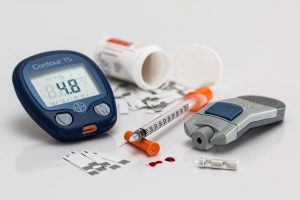 Intensive management of type II diabetes may make a huge difference on how long, as well as how well, you will live, according to this study. Even if you failed to manage your diabetes until beyond middle age, beginning management now could have a dramatic impact on your longevity and quality of life with the disease, the research reports.
Intensive management of type II diabetes may make a huge difference on how long, as well as how well, you will live, according to this study. Even if you failed to manage your diabetes until beyond middle age, beginning management now could have a dramatic impact on your longevity and quality of life with the disease, the research reports.
People who were at risk of complications associated with type II diabetes were selected randomly. They either pursued their usual treatment or were put in a group treated with multi-pronged and aggressive treatment programme. Two decades after the start of the research, the scientists have discovered that people involved in an aggressive treatment team lived nearly 8 years longer. Additionally, they lived much better and their risk of kidney disease, heart disease, and blindness dropped significantly. The only complication which does not improve is nerve damage triggered by diabetes, which is permanent.
Early and intensified intervention of patients diagnosed with type II diabetes, treated with microalbuminuria, together with a target driven pharmacological medicine regime and some behavioural actions are the course of treatments that showed the results of a lengthened life span. Not only that, but the additional lifespan will be relatively free from serious or feared complications. It was confirmed by Dr. Oluf Pedersen, who specialises in endocrinology and internal medicine at the Novo Nordisk Foundation Centre for Basic Metabolic Research at the University of Copenhagen, which is situated in Denmark.
Microalbuminuria is the term pertaining to an amount of protein in your urine. Protein in the urine is a sign which means the kidneys are not working properly, and it is also the initial symptom of diabetic kidney injury according to ADA or American Diabetes Association.
Somebody with this condition is likely to develop some other complications associated with diabetes since it’s the marker for general blood vessel damage, as explained by Pedersen. Their average age was around 55 at the beginning of the research, which started in 1993. Everyone was overweight, bordering on obesity, according to the data that was collected at the outset of the study. Pedersen mentioned that the objective of intensive treatment is to resolve all changeable risk factors for early death and complications. Such factors involve blood sugar, cholesterol, blood pressure and triglycerides as well as the danger of blood clots.
If appropriate, medicines like cholesterol-lowering statin or drugs for hypertension were prescribed. Behaviour modification was a crucial aspect of intensive treatment. The study volunteers are instructed on making exercise and healthy diet changes. They were given help in order to stop smoking. The patients were cured at Steno Diabetes Centre located in Copenhagen for nearly 8 years. They were consistently motivated and educated, according to the staff. All of this motivation, clearly, has been paid off.
The blood pressure of the patients dropped. Their good cholesterol level went up, while the bad ones -as well as the triglycerides- also dropped. After more than twenty years, 38 of the people who participated in the group that underwent intensive treatment died, versus the 55 people who were in the traditional treatment group. Aside from longer survival, this intensive group got an average 8-year delay with the onset of heart disease and stroke.
The benefits were so clear following the ending of the intensive treatment that both of the two groups, the intensive and traditional treatment alike, got the chance to continue the intensive treatment if they wanted to!
Dr. Joel Zonszein is director of the Clinical Diabetes Centre at Montefiore Medical Centre in New York City. “These results are impressive, and the message is important. Physicians are not being aggressive enough, and aren’t treating to targets at the beginning,” he said. “If you look at all the factors they (the Danish researchers) treated, about 80 per cent of the U.S. population isn’t treated correctly, according to national surveys,” said Zonszein, who wasn’t involved with the study.
